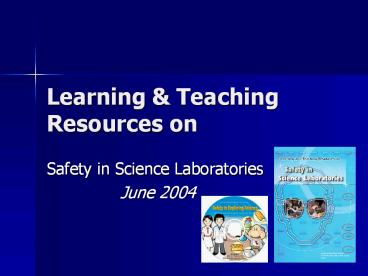Learning%20 PowerPoint PPT Presentation
Title: Learning%20
1
Learning Teaching Resources on
- Safety in Science Laboratories
- June 2004
2
Exemplars of Activities
- Laboratory Safety Rules
- Eye Protection
- Safety Information on Chemicals
- Risk Assessment
- What if a Laboratory Accident Happens?
3
Laboratory Safety Rules
- The biggest danger in the lab is YOU (student)!
You are a danger whenever you are either ignorant
or careless or both. Remember this because the
person most likely to suffer from your mistakes
is YOU! - ASE (1996) Safeguard in the School Laboratory, ASE
4
Laboratory Safety Rules
- Introduction
- Group Discussion
- Ask students to discuss and write the rules they
should observe in the lab - Review the results of discussion
- Summary
- Signing a Safety Contract and distribute copies
of lab safety rules - Select safety rules applicable to your class
- Posters, slogans, websites, quizzes
- Reference
- Flinn Scientific's "Ideal" Student Safety
Contracthttp//www.flinnsci.com/Documents/miscPDF
s/Safety_Contract.pdf - Contracting for Safety http//www.statweb.org/AC
T2/parents.pdf
5
Safety Contract
Kei Heep Secondary School
6
Illustrated Safety Rules
- http//www.mindspring.com/mfallonsp/safety_rules/
7
Eye Protection
- Importance of eye protection
- Illustrated by a student experiment or teacher
demonstration on irreversible denaturing of
eye-white by acid - Discuss on when eye protection should be worn
- Demonstration/video on the use of eye wash unit
8
Safety Information on Chemicals
- Know how to locate and understand safety
information of chemicals - Chemical formula, hazards, safety precautions,
emergency, disposal, etc
9
Online MSDS
- http//www.ilpi.com/msds/index.html
- http//hazard.com/msds
- http//www.freyscientific.com
- http//www.sargentwelch.com
- http//www.flinnsci.com
- http//www.fisheredu.com
- http//www.msdsprovider.net
- http//www.camd.lsu.edu/msds_search.html
- http//ptcl.chem.ox.ac.uk/MSDS
10
Risk Assessment
- An analysis of a practical activity to identify
hazards and to take precautions to minimise the
risk - Involve students in thinking about and discussing
safety in real context, rather than just being
told what to do - Novel experiments in science publications,
open-ended investigations and project learning,
etc. - Have to be checked by teachers
11
Risk Assessment
- Procedures
- Identifying hazards (Materials / Procedures /
Equipment) - Assessing how likely the hazard will actually
cause harm (risk) - Deciding what control measures to reduce risk to
acceptable level - Finding how to dispose of hazardous residues
- Review
- Examples 1, 2, 3
- References Safety Handbook, Hazcards, Student
Safety Sheets, ICSCs, MSDSs, CLIP (Chem Lab
Information Profile), etc.
12
Risk Assessment Think thrice before you act
- Hazards
13
Reducing the Risks
- Using safer alternatives
- Modifying experimental procedures
- Reducing the scale of experiments
- Reducing the concentrations of solutions
- Using protective measures
- Wearing appropriate PPE
- Alasdair Thorpe, Chemistry Review, Sept 2000
14
Risk Assessment
- Forms
- Annotate daily used documents (point-of-use
texts) e.g. schemes of work, lesson plans,
worksheets, textbooks, lab request forms and
apparatus - A better chance that they will be read and
followed - Less demanding to accomplish and more likely to
be carried out - Assessment more likely to be modified when the
activities have be be modified - Managing Risk Assessment in Science, L196, CLEAPSS
15
What if a Laboratory Accident Happens?
- Know the proper actions to be taken in case of
laboratory accidents - Be aware of the nature and causes of laboratory
accidents, and the basic safety precautions for
prevention - 12 adapted cases for discussion
- Eye accidents (3), fire, heat burn, cut,
explosion (2), animal bite, corrosive chemicals
(2), toxic gas
16
Microscale Version
Pins
Shampoo solution
0.4 M NaOH
17
What if a Laboratory Accident Happens?
Iron/sulphur Reaction
Conc. Sulphuric Acid
Methyl 4-hydroxybenzoate
18
http//cd.emb.gov.hk/sci
19
Safety in Exploring Science
- Interactive learning package
- On-line and CD-ROM versions
- http//resources.emb.gov.hk/ses
20
Safety Quiz
- Questions with feedbacks to both correct and
incorrect answers - Enable students to evaluate and improve their
understanding on laboratory safety - Written Safety Test in Safety Handbook for
California Public Schools http//csmp.ucop.edu/cs
p/downloads/safety.pdf - Wordsearch
21
On-line Safety Quiz
- Interactive and Interesting MC QuestionsMillionn
aire Game http//jasonhk.uhome.net/ - Chemistry Safety Quiz http//daphne.palomar.edu/sa
fetyquiz - Safety in Hargrave's Laboratorieshttp//www.hargr
ave.edu/academics/science/safetyCertificate of
Completion - Fire Safety Quizhttp//www.survivealive.org/quiz.
html - Hot Potatoes create interactive MC,
short-answer, jumbled-sentence, crossword,
matching/ordering and gap-fill web-based
exercises http//web.uvic.ca/hrd/hotpot
22
Other Strategies
- PowerPoint on Safety facilities and PPE
http//www.umd.umich.edu/casl/natsci/slc/modulist.
html - Self-learning e.g. ????http//www.naturalking.net/
exercise.htm - Role play
- Certificates
- Project work e.g Fire Escape Route Indicator
23
Health, Safety Risk
- Student worksheets e.g.
- Risk assessment in science experiments
- Safety symbols
- Can be downloaded in Word format from
http//www.chemsoc.org/networks/learnnet/hsr.htm
24
More Learning Activities
- http//csmp.ucop.edu/csp/resources/curriculum.html
25
Inquiring Safely
- Terry Kwan Juliana Texley (2003)Inquiring
Safely A Guidebook for Middle School Teachers,
NSTA - Entire book at http//www.nsta.org/main/pdfs/store
/PB166X2np.pdf
26
Acknowledgement
- Dr Albert C Cheung (City University of Hong
Kong) - Ms Chu Suk Ching (True Light Middle Sch of HK)
- Dr Joseph K Kwan (HKUST)
- Mr Lee Charn Kau (HKTA Ching Chung Sec Sch)
- Mr Leung Kar Yau (retired)
- Mr Lo Kam Cheong (CCC Kei Heep Sec Sch)
- Mr Mok Ming Wai (United Christian College)
- Mr Pun Kwong Cheung (SKH Tsang Shiu Tim Sec Sch)
27
Thank you !
- Mr W C HO
- cdosc21_at_emb.gov.hk
- Tel 2712 8476

